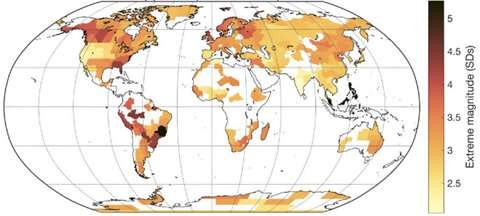
A new study has revealed the most intense heatwaves ever across the world, and some of these went almost unnoticed decades ago.
As climate change gets worse, the research shows that heatwaves will get hotter.
The all-time Canadian high of 48.6 °C was set in British Columbia on June 29 last year, an increase of almost five degrees from the previous peak.
Five other heatwaves around the world were even more severe, but were not reported.
The recent heatwave in Canada and the United States shocked the world. We show that there have been even greater extremes in the last few decades. Climate models show that extreme heat events are likely to increase in magnitude at the same rate as the local average temperature.
Extreme weather events such as heat waves are the most devastating. Hundreds of deaths were caused by the most deadly weather event ever in Canada. Infrastructure damage and loss of crops were caused by the raging wildfires.
The top three hottest-ever in the respective regions were in Southeast Asia in April 1998 with a temperature of 32.8 C, and in Brazil in November 1985 with a temperature of 36.5 C.
The western North America heatwave will be remembered because of its widespread destruction. The study exposes several greater meteorological extremes in recent decades, some of which went largely under the radar due to their occurrence in more deprived countries. It is important to assess the severity of heatwaves in terms of local temperature variability because both humans and the natural eco-system will adapt to this, so in regions where there is less variation, a smaller absolute extreme may have more harmful effects.
Climate model projections were used by the team of scientists to anticipate heatwave trends in the rest of the century. The levels of heatwave intensity are expected to rise in line with global temperatures.
The highest local temperatures do not always cause the biggest impacts. Improving understanding of climate extremes and where they have occurred can help prioritize measures to help tackle this in the most vulnerable regions.
Climate change is one of the greatest global health problems of our time, and we have shown that many heatwaves outside of the developed world have gone largely unnoticed. The country-level burden of heat on mortality can be in the thousands of deaths, and countries which experience temperatures outside their normal range are the most susceptible to these shocks.
The University of Bristol became the first UK university to declare a climate emergency in the year 2019.
More information: Vikki Thompson, The 2021 western North America heat wave among the most extreme events ever recorded globally, Science Advances (2022). DOI: 10.1126/sciadv.abm6860. www.science.org/doi/10.1126/sciadv.abm6860 Journal information: Science Advances Citation: Scientists identify the most extreme heatwaves ever recorded globally (2022, May 4) retrieved 4 May 2022 from https://phys.org/news/2022-05-scientists-extreme-heatwaves-globally.html This document is subject to copyright. Apart from any fair dealing for the purpose of private study or research, no part may be reproduced without the written permission. The content is provided for information purposes only.